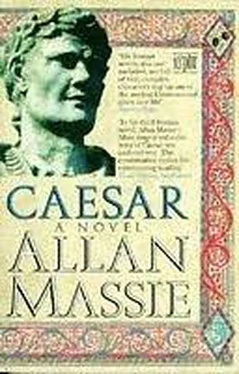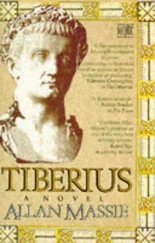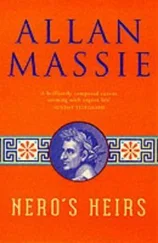Allan Massie - Caesar
Здесь есть возможность читать онлайн «Allan Massie - Caesar» весь текст электронной книги совершенно бесплатно (целиком полную версию без сокращений). В некоторых случаях можно слушать аудио, скачать через торрент в формате fb2 и присутствует краткое содержание. Жанр: Исторические приключения, на английском языке. Описание произведения, (предисловие) а так же отзывы посетителей доступны на портале библиотеки ЛибКат.
- Название:Caesar
- Автор:
- Жанр:
- Год:неизвестен
- ISBN:нет данных
- Рейтинг книги:3 / 5. Голосов: 1
-
Избранное:Добавить в избранное
- Отзывы:
-
Ваша оценка:
- 60
- 1
- 2
- 3
- 4
- 5
Caesar: краткое содержание, описание и аннотация
Предлагаем к чтению аннотацию, описание, краткое содержание или предисловие (зависит от того, что написал сам автор книги «Caesar»). Если вы не нашли необходимую информацию о книге — напишите в комментариях, мы постараемся отыскать её.
Caesar — читать онлайн бесплатно полную книгу (весь текст) целиком
Ниже представлен текст книги, разбитый по страницам. Система сохранения места последней прочитанной страницы, позволяет с удобством читать онлайн бесплатно книгу «Caesar», без необходимости каждый раз заново искать на чём Вы остановились. Поставьте закладку, и сможете в любой момент перейти на страницу, на которой закончили чтение.
Интервал:
Закладка:
Well, that comes closer to the point, of course.
What I am saying may appear evasive to any reader of this memoir — if I survive to finish it, and if it survives to find a reader — but I do not think the events in which I was concerned can begin to be understood if Caesar himself, in his manifold variety, is not at least offered for understanding.
Which leaves me with the question I can't answer: was there any other reason why the disgraceful episode with King Nicomedes did him so little lasting damage?
I once, years later, asked my mother if she believed Caesar had ever really loved her. She laughed.
"Of course not, darling," she said. "I adored him, but that was quite different. I couldn't even deceive myself at the time. I knew for instance that he was carrying on another affair simultaneously, with Postumia Sulpicius — a very silly woman by the way. No, Caesar wasn't like Pompey, who, it may surprise you to know, really adored the women with whom he was engaged. Of course, there was another difference. Pompey as a young man was really beautiful. You won't believe that, looking at him now; but he was so beautiful we used to say that every woman just wanted to bite him. Caesar was, I suppose, handsome, in a cold sneering sort of way, but it wasn't his looks that won him his successes, which, by the way, included Pompey's second wife, Mucia — or was she his third, I can't remember. Anyway she was the mother of three of his children, and Pompey thought she was absolutely secure. And so she was, till Caesar came along. He used to call Caesar 'Aegisthus', you know." "Aegisthus?"
"Oh, you are slow, Mouse. Aegisthus, the lover of Clytem nestra. Mind you, this didn't stop Pompey from marrying Caesar's daughter, years later. But you know that, of course. Poor girl."
"Poor girl?"
"Well, Pompey was impotent by then, Mouse, besides being usually drunk by bedtime, they say. No, if you ask me there was only one woman that Caesar ever came close to loving, and I've never understood why."
"Who was that?"
"Servilia. Your cousin Marcus' mother." "Servilia, that dragon?"
"She may seem a dragon to you, Mouse, but she's a very clever woman. She knew how to hold Caesar. He kept returning to her."
"Well, I knew of course that they were allies, and that they'd had an affair. That was no secret. We used to make Markie weep about it when we were children. But all the same, that bore, with her constant talk about virtue and her relationship to the Gracchi. You really think he loved her?"
"Yes," my mother said, "which didn't stop her from prostituting your cousin Tertia for Caesar's delight."
Tertia was a sweet little thing, not like her mother at all. She took to drink and died young. Perhaps my mother was right after all.
And of course Cicero, I remember, uttered one of his bons mots on the subject. When Caesar arranged two or three years ago to have some confiscated estates knocked down cheap to Servilia at what was supposed to be a public auction, Cicero said:
"It was even cheaper than you think, because a third (tertia) part had been discounted."
It was rumoured, of course, that Marcus Brutus was Caesar's son. When he was a small boy, this accusation would also reduce him to tears of shame and fury. Later, he rather encouraged the notion, while professing that it was impossible. Like all people who parade their virtue, my cousin Markie is a twister, Janus-faced.
Young Artixes said to me: "You talked of his charm and authority. But all I see is a scoundrel. And I am still amazed that you could follow such a man. It was clear to us Gauls that he was a destructive force. Couldn't you feel that yourself?"
"Artixes," I said, "I don't know if you have heard what Marcus Cato said."
"I don't even know who Cato was."
"You're fortunate. Anyway, he said: 'Caesar was the only sober man who ever tried to wreck the Constitution.'" "I don't understand what you mean by that." "Never mind."
"Come," I said to Artixes, seeing disappointment in his face, "let us take a stroll in the evening air, and I'll try to explain."
(The circumstances of my arrest are not, you see, at present either arduous or oppressive. I am rather well treated, in fact, and I am having to revise my notions about Gallic civilisation. It is true that such wine as they have is abominable, but my comforts are considered, and the food is tolerable. Best of all, I have a sort of wild garden in which I am permitted to walk — under supervision, of course. It descends to a river, and there are mountains across the plain. It is pleasant in the evening under the chestnut trees, with the scent of ilex in the air. And young Artixes is a charming companion; I have really grown quite fond of him.)
The evening air was soft. Birds sang. A dog barked in the village below. The laughter of girls rose towards us, and Artixes said, "What do you mean by the Constitution? This is a word I have heard Romans speak before and it always puzzles me."
"It puzzles us too," I said. "That is part of the problem. You must understand, Artixes, that years ago Rome was ruled, as your tribes are, by kings."
"Well," he said, "that's only natural. Everyone has kings, surely."
"Not exactly. Some states are what we call republics. No, don't ask me to explain, you will understand what a republic is when I have finished. But if I explain every word then we'll never get anywhere. Now the Romans were dissatisfied with their kings."
"Why?"
"Well, first, they were foreigners." "I call that feeble, to take foreigners for kings." "Perhaps it was, I don't know, it was a long time ago. Then the son of the King was a bad man." "What did he do?" "Raped a girl."
He looked at me with what I took to be dismay, lost again.
"But he was the King's son," he said. "Surely she should have been honoured to do his bidding."
"You might think so, but she wasn't, and her father and brothers were very angry. They rose up against the King and drove him out of the city."
"Yes," he said, "I understand that. So they made themselves kings."
"Not exactly. The Romans then decided kings were a bad idea. Don't ask me why. They just did. So they decided to have a new, different form of government. Instead of one man being king for life, they would divide the government between two men who would be equal to each other, and who would only hold power for a year. They weren't called kings, but consuls."
"Were they killed at the end of the year?"
"No."
"Then how did they persuade them to give up power?" "They just did. Those were the rules." "And this still happens?"
"We still have consuls. I should have been consul myself next year."
"And now you're not. You're here instead." "Yes. Only nowadays the consuls don't have much real power."
"I understand. This way of doing things doesn't work."
"It worked well for a long time. Very well. Too well perhaps. Rome became great and powerful. You know that, you have felt our power. We conquered other countries and tribes and extended our Empire."
"Yes, you kill people and call it peace."
"If you say so, but that's not how we see it. Anyway the Empire became so big that generals had to command armies and provinces for a long time, and in the end the generals became more powerful than the consuls."
"So the generals became kings."
"Not exactly."
Sometimes I wonder if Artixes is quite as ingenuous as he seems to be. He has after all lived in Rome, admittedly in a species of detention. He must know more about Roman politics than he pretends. But when he looks at me with his blue eyes wide open, and smiles in that frank admiring fashion, I can't think him other than innocent.
And yet… I put my arm round his shoulder.
"Artixes, you know all this, I think."
He smiled again.
Читать дальшеИнтервал:
Закладка:
Похожие книги на «Caesar»
Представляем Вашему вниманию похожие книги на «Caesar» списком для выбора. Мы отобрали схожую по названию и смыслу литературу в надежде предоставить читателям больше вариантов отыскать новые, интересные, ещё непрочитанные произведения.
Обсуждение, отзывы о книге «Caesar» и просто собственные мнения читателей. Оставьте ваши комментарии, напишите, что Вы думаете о произведении, его смысле или главных героях. Укажите что конкретно понравилось, а что нет, и почему Вы так считаете.












